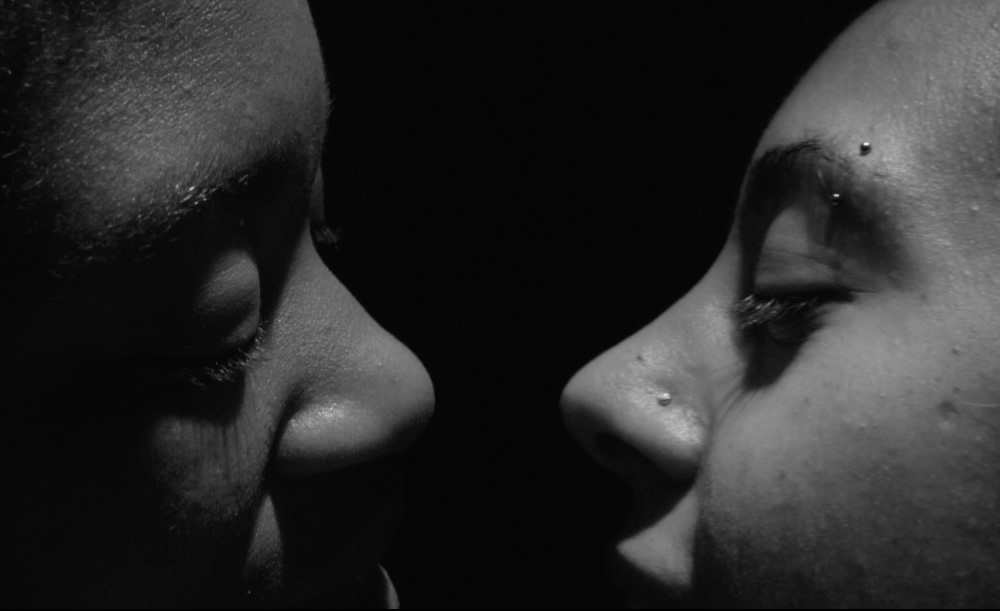Warning: This is a difficult watch. Ordinary viewers might want to gather themselves before proceeding; victims of domestic abuse, especially survivors of same-sex abuse, should take a moment to consider whether they want to plunge forward. As the second part of Cinema Novo’s Seven Headed Lion anthology, it’s possible to view “Isonade” in a metaphorical context. Those who witnessed the series’ first offering, “Horse Eater,” learned that each song in the cycle will be inspired by a different mythological creature from various countries and cultures. In the case of “Isonade,” it refers to an ancient sea creature said to have lived off the coast of Japan, a giant monster who would silently approach the surface before utilizing its powerful tail to capsize nearby boats and drag sailors down to their death.
But while the mythical Isonade may serve as an apt symbol for the horrors of an abusive relationship, especially of the violence that often arrives unexpectedly when it’s already too late for the victim, the video approaches the subject in a far more direct and visceral manner. Directed by guitarist Christopher Richardson, “Isonade” is a dark and harrowing recounting of vocalist Haseena Peera’s personal experiences with same-sex domestic violence. The narrative begins in a motel room where Peera and her partner are first witnessed in what appears to an amorous relationship. The footage is carnal and highly sexualized with intimate close-ups of the couple engaged in the early throes of lovemaking. In many ways, it feels exploitative and fetishized, but according to Peera, that’s exactly the point.
“The epidemic of same-sex domestic violence is not something that’s ever talked about,” she explains. “There are a lot of factors to this. Only very recently has homosexuality been seen in a positive light. Not only are same-sex partners ashamed of making their community look worse in the eyes of authority, but they were often not taken seriously if they did report domestic violence. Women in same-sex relationships are highly over-sexualized in part via the porn, film, and music video industries. This is why we chose to begin this narrative with the familiar over-sexualization of female couples. After priming the viewer with the sexual imagery, we show just how serious this issue is.”
While the early portions of “Isonade” are heavily eroticized for dramatic effect, the middle portion is a grim and disturbing depiction of the traumatic abuse that occurs behind closed doors. Richardson maintains a similar aesthetic throughout utilizing stark black and white cinematography and quick cuts, but rather than focusing exclusively on the intermingling of two bodies as he does in the beginning, he introduces outside elements — bottles of alcohol, shattered picture frames, overturned lamps — to help reinforce the destructive chaos that domestic abuse drags in its wake. By the time the video heads towards its macabre conclusion, the atmosphere is rife with threatening tension, but it’s still difficult to dismiss the lingering air of charged sexuality.
“Women are not only just as violent as men, but violence within the home happens to people in a heartbeat,” Peera says. “It is a twisted, long, and hard journey of very high points and extreme low points—like an ocean wave—that can change in a simple matter of seconds without warning. This is why people stay in toxic relationships. It is a dance, much like sex; it can get as horrific as it can be pleasurable behind closed doors.”
“Isonade” concludes in fatal fashion with Peera attempting to run away in vain. Her partner’s stone-faced determination is jarring, and by the time Peera’s body hits the water, there’s no doubt as to what her fate will be. The watery nature of her death is a shrewd homage to the monster that inspired the song, one that deftly guides the video to its bleak resolution.
While the message here is ominous and deadly, it’s also vital and necessary. Too often the affliction of domestic abuse continues undetected with victims to afraid or ashamed to speak out. For Peera, “Isonade” was not only an opportunity to speak her story, but also a means to help viewers understand that violence is violence and victims that come forward need to be acknowledged, listened to, and supported.
“This video was the hardest thing for me to re-live because it was truly one of the lowest points in my life, and I never reported it, not even once,” Peera reveals. “I felt dead to myself and invisible to the world, and I hope that just like the myth, this can act as a warning to anyone in a similar situation before it’s too late… Being in my own shoes, remembering what it really feels like to feel dangerously alone, even just playing the part during a film shoot, was completely surreal. It drove home that these things aren’t just statistics, and should be spoken about more often.”
In terms of the larger context of Cinema Novo’s Seven Headed Lion, the video also continues the group’s examinations of history and human nature. Although it’s recalling a specific experience, “Isonade” is meant to invoke mortal truths, and does so in a manner that is raw and devastatingly honest.
“If there’s one overarching theme spanning the entire series, it’s that humans haven’t really changed all that much,” says Richardson. “Things like vice, jealousy, violence, attraction, greed — they’re all still on the table in terms of what humans are capable of. We’re taking the demons and monsters of our ancestors and giving them new faces.”
More Info
Web: cinemanovomusic.com
Bandcamp: cinemanovo.bandcamp.com
Facebook: @cinemanovoatl
Instagram: @cinemanovo
SoundCloud: @cinema-novo

